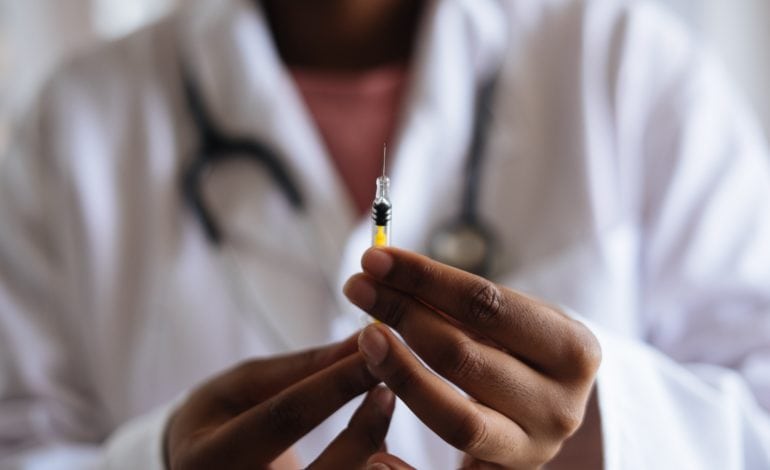Vivitrol is the brand name for Naltrexone-extended release, an injectable treatment for alcohol use disorder or opioid use disorder. Naltrexone, the main ingredient in Vivitrol, is an opioid antagonist. It binds to the opioid receptors (pockets) in the brain. Once bound to the receptor, it prevents opioids such as heroin or morphine from binding to these receptors, therefore blocking the opioid response in the body.
In the absence of naltrexone, opioids bind to their receptors. When this binding occurs, dopamine and other brain chemicals are released to elicit a “feel-good response” throughout the body, relieving the body of pain and producing feelings of euphoria. Naturally, the individuals want to feel more of this response and, as a result, take more opioids, potentially leading them down the road of opioid addiction. The same receptor, binding, and response pathway work for alcohol.
When naltrexone is administered, naltrexone sits in the opioid or alcohol receptor, preventing alcohol or opioid from binding to that receptor. If opioids or alcohol are still in the bloodstream, naltrexone will cause the individuals to experience opioid or alcohol withdrawals. Therefore naltrexone is usually not given during the initial detoxification phase of treatment but instead is used for long-term treatment once the individual is no longer actively using alcohol or opioids.
Naltrexone helps with long-term opioid and alcohol treatment by decreasing the reinforcing reward of continued use of opioids and alcohol. It also helps reduce cravings associated with alcohol and opioids.
Vivitrol shots can be extremely effective when used in combination with psychotherapy and substance abuse support groups.
Although naltrexone is available in different forms, the injectable form, specifically known as Vivitrol, is commonly used in addiction treatment centers because a licensed healthcare professional can administer this medication monthly. The oral form of naltrexone can be administered once daily.
Criteria for Vivitrol administration
Because the active ingredient in Vivitrol is naltrexone which is an opioid antagonist (blocker), it will induce opioid or alcohol withdrawal if these substances are in the bloodstream. Therefore individuals must be opioid and alcohol-free for at least 7-10 days before this medication can be given. As a result, a reputable addiction treatment center will require a urine drug test to screen for alcohol or opioids to ensure the individual is not at risk of withdrawal before administering Vivitrol. Suppose an individual is currently enrolled in a methadone treatment program or has been taking Suboxone for their opioid use disorder. In that case, treatment centers usually require that the individual must discontinue these medications a couple of weeks before they start taking Vivitrol. This usually only happens if a client is moving from one addiction treatment center to another.
Pros of Vivitrol in opioid and alcohol addiction treatment
- Vivitrol shots has the potential when used correctly and in conjunction with behavioral therapy, to decrease relapsed rates in clients who have an alcohol or opioid use disorder.
- Vivitrol shots decreases opioid and alcohol urges and cravings.
- Vivitrol does not require a “drug taper” meaning it does not have to be administered at lower doses overtime to wean. As a result, this medication can be stopped at any time with any risk of opioid or alcohol withdrawal.
- Vivitrol is a long-acting injectable medication that is administered monthly and does not require regular monitoring.
- Vivitrol is a convenient treatment tool for opioid or alcohol use disorder.

Precautions associated with Vivitrol use
- Individuals must not be at risk of opioid or alcohol withdrawal before taking Vivitrol. In other words, they must be opioid and alcohol-free for a certain duration before this medication can be administered.
- Vivitrol shots can be expensive out of pocket, but some private insurance cover this medication. Always check with your insurance company to see if they cover this medication.
- If an individual takes methadone or Suboxone, they cannot immediately start taking Vivitrol because there is a mandatory medication-free waiting period.
Signs and symptoms of opioid and alcohol use disorders
Opioid use disorder and alcohol use disorder are both medical conditions that occur over time when the individual misuses either alcohol or opioids or both. The individual cannot cut down on or stop using alcohol or opioids, despite the negative consequences associated with their misuse. These consequences can include trouble with the law, problems at work or school, family or relationship discord, or medical or mental health complications. Additionally, individuals with alcohol or opioid use disorders will experience strong urges and cravings to use.
Opioid overdose is extremely lethal and can happen from prescription pain medications or illegal street opioids such as heroin. Alcohol withdrawal, which happens when an individual becomes physically dependent on alcohol and tries to cut down or stop using altogether, can be extremely lethal. Therefore medications are necessary during the acute withdrawal period. The following are common signs and symptoms associated with alcohol or opioid use disorder:
- Mood swings/behavioral changes
- A decline in hygiene
- Financial strains due to spending too much money buying alcohol or opioids
- Problems concentrating
- Poor work or school performance
- Loss of interest in hobbies or activities that were once enjoyed
- Strain on personal relationships
- Problems sleeping
- Legal problems
- Poor decision making (driving while drinking, high-risk sexual behavior while under the influence)
- Social isolation
- Spending a lot of time thinking about using, recovering from using, and trying to obtain alcohol or opioids
- Unable to cut down or quit using opioids or alcohol
Vivitrol and psychotherapy
Medication-assisted treatment (MAT) is administering medications such as Vivitrol in long-term recovery in conjunction with behavioral therapy in hopes of preventing urges, cravings, and relapses. The term “MAT” is sometimes used to describe administering medications during the detoxification phase; however, in general, MAT is not associated with the detox phase but rather the long-term treatment phase. Medications that are given during the detox phase are usually known as “detoxification medications” and are specifically used to reduce or alleviate withdrawal symptoms. In addition, long-term medications known as MAT are given to reduce urges, cravings, and relapses. If you are struggling with an opioid or alcohol use disorder, AKUA Mind and Body can help you enter into detoxification and long-term recovery.




